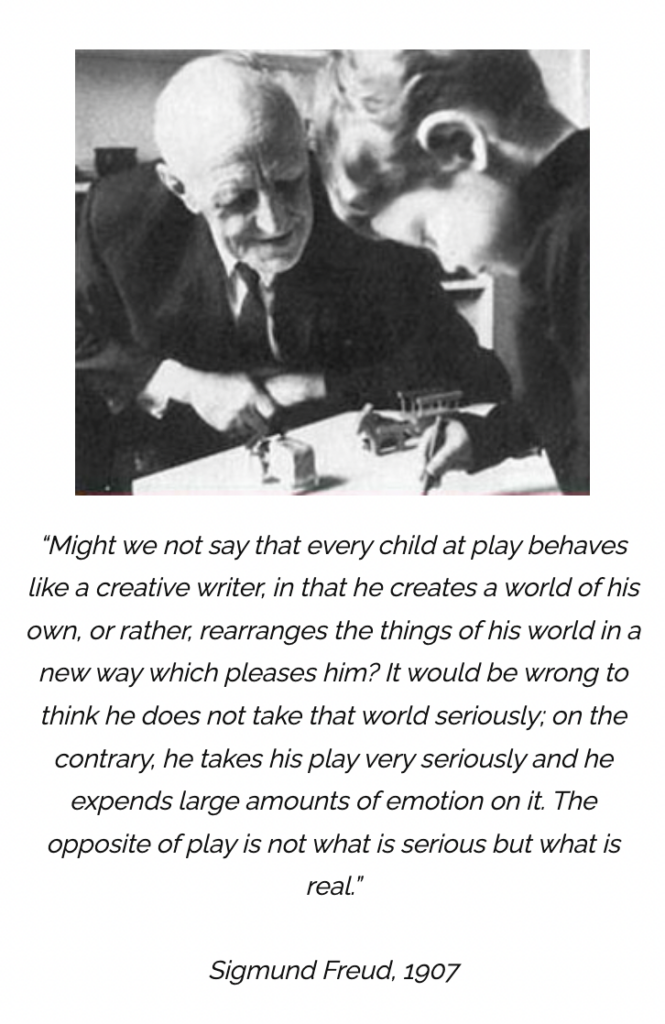Psihoterapeut koji radi s djecom i adolescentima mora imati posebno dodatno obrazovanje kako bi mogao primjenjivati odgovarajuće terapijske tehnike prilagođene bio-psiho-socijalnim fazama razvoja djeteta, njegovim poteškoćama, te odnosima s roditeljima i okolinom.
Terapijske vještine i ekspresivne tehnike se prilagođavaju fazama razvoja djeteta i njegovim individualnim potrebama, što uključuje i pažljiv odabir projektivnih medija. Uloga terapeuta u ovom procesu je izrazito kompleksna. Terapeut je odgovoran za stvaranje sigurnog okruženja, postavljanje granica i etičnost terapijskog procesa, dok istovremeno u terapijski odnos unosi unutrašnje psihičke procese djeteta i odnose s roditeljima. Novi odnosi izgrađeni kroz terapiju često postaju ključni za djetetove buduće odnose.
Posebni izazovi u psihoterapiji djece i mladih proizlaze iz djetetovih problema s motivacijom, ograničenih kapaciteta retrospekcije i teškoća u razumijevanju vremenske perspektive. Kod adolescenata, dodatnu poteškoću predstavlja zaokupljenost odbranama ega od terapeuta, što može otežati uspostavljanje terapijskog odnosa.
Psihoterapija djece i adolescenata značajno se razlikuje od psihoterapije odraslih, posebno u pogledu uloge terapeuta, odnosa s roditeljima i saradnje s njima. Uspješnost terapije djece i adolescenata u velikoj mjeri zavisi od kvalitetne saradnje s roditeljima, koja direktno utiče na prihvaćanje same terapije.
Program psihoterapije djece i adolescenata temelji se na razvojnom pristupu, koji integriše humanističke i integrativne modalitete, uključujući psihoanalizu, sistemsku porodičnu i gestalt terapiju, transakcionu analizu, self-psihologiju, teorije razoja, teorije odnosa i neuroznanost.
Razvojna perspektiva programa inspirisana je radovima istaknutih stručnjaka poput Johna Bowlbya, Donalda Winnicotta, Daniela Sterna, Allana Schorea, Margaret Mahler, Melanie Klein i drugih.
Program osposobljava kandidate za sticanje profesionalnih i akademskih kompetencija, s posebnim fokusom na kliničke vještine, profesionalnu kompetenciju, lični razvoj, superviziju te kapacitet za multidisciplinarnu i međusektorsku saradnju. Program u potpunosti zadovoljava kriterije dobre kliničke prakse, osiguravajući visok standard edukacije i istraživanja.

Osnovna filozofija programa
temelji se na:
- Odnosu dijete-roditelj koji je najvažniji za kreiranje unutarnje psihičke strukture djeteta i adolescenta
- Unutarnjoj dječjoj strukturi koja utječe na odnose s okolinom koji imaju tendenciju ponavljanja povijesti i stvaranja životnog skripta i srama
- Selfu koji nije entitet već kontinuirani proces koji je socijalno, afektivno i odnosno strukturiran kroz odnose s roditeljima i drugim važnim osobama, a uobličava se kroz socijalne, ekonomske i kulturalne karakteristike
- Odbranama kojima se djeca brane od promjena, djelomično iz sigurnosti, te nastoje zadržati postojeće stanje
- Otporima prema osjećajima koji dolaze iz prošlosti u sadašnji kontekst djetetovog života, ali i ukazuju na moguće terapijske intervencije
Osnovna pravila psihoterapijskog tretmana, bez obzira na bazične pristupe, uključuju:
- Dobro poznavanje razvojnih faza
- Poznavanje obiteljske dinamike koja je značajna jer kroz nju dijete percipira svijet i sebe u svijetu i nastala iskustva prenosi na sve druge odnose kasnije u životu
- Poznavanje i drugih značajnih osoba u djetetovom životu
- Poznavanje zaštitnih i rizičnih faktora
- Poznavanje neuroznanstvenih spoznaja
- Zakonskih okvira o zaštiti i dobrobiti djece
